What You Will Need If the Power Goes Out
Hopefully, you’re only dealing with a temporary power outage if you wake up one morning and find your home without electricity. While it may not be a life-or-death situation, going without electricity for extended periods has significant inconveniences. To help make your situation more manageable, you’ll want to stock up on several emergency items. You need to have these emergency supplies ready if the power goes out.
Power outages can have a variety of causes. The challenge may be with your electric utility company, though that is seldom the problem. You more often experience outages due to severe weather with related high winds, ice storms that put additional weight on local power transmission lines, or an automobile accident in which a vehicle plows into a power station or power pole supporting a transformer. This past week, an unhappy resident drove down a main street in Draper, UT, with the dumper bed of his truck fully extended. It tore down dozens of power lines and poles, causing a blackout for most of the day for local communities.
In the event of an emergency, what caused it isn’t your immediate concern, but how to deal with the next few hours or days without the ever-present electrical power you often take for granted. We’ll try to help you prepare now so you are best equipped to make it safely through with the least amount of disruption. I highly recommend this Bushnell Lantern/Flashlight (I have one next to my bed 24/7).
If you haven’t read “Lights Out”, you need to; it is not fiction, but fact-based.
What You Will Need If the Power Goes Out
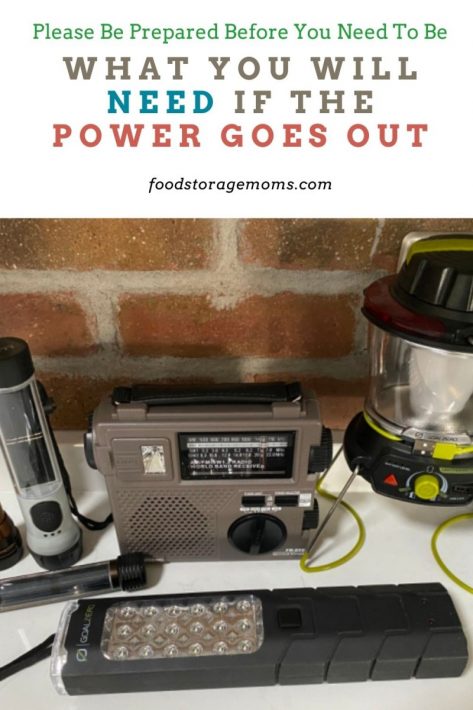
1. Non-Perishable Food Products and Liquids
Having an emergency food supply in your pantry will be a godsend that your family can fall back on because you never know if your local grocery store will be open. You should have at least a one to two-week food and water supply. Consider having the following:
- Canned fruits and veggies
- Canned meats
- Canned soups
- Dried fruit
- Protein bars
- Nuts, Trail mix, beef jerky
- Bottled water
- Gatorade/Powerade
Power outages aren’t necessarily weather—or climate-related. They could happen in either hot or cold weather. Either way, canned and properly packaged foods will last a while as you adjust to losing power. You’ll want to try to maintain a semblance of your everyday routines as best as possible, including meal preparation.
Being able to heat foods is essential, especially if the temperature in your home is cold. Part of your preparedness plan is to have propane or butane cooking devices. You can cook many things on BBQ grills, but it isn’t the most efficient cooking device. Those trusty camp stoves or tabletop butane units are great for boiling water, heating soups, warming up meats, and more. Plan to have enough fuel to last a week or longer. (See Item #4 Below)
Meals also require paper supplies and plastic utensils since the dishwasher won’t be working. Consider paper plates, paper towels, paper or plastic cups, and napkins. Depending on your preparation, sharp knives, serving spoons, and other kitchen tools may not be as important.
When it comes to food, remember infant formula, pet food, and food items for unique-needs family members like those with allergies.
2. Water Purification
If your power outage turns into something that lasts for a couple of weeks, you may eventually run out of your supply of bottled water. There’s also the chance that the tap water from your kitchen sink may be unsafe to drink. You’ll want to invest in a water filter system that removes particles in your drinking water. You could also buy Purification Tablets from Amazon or one of your local stores.
I’ve been writing about water’s critical role in our everyday lives for years. We need it not only for proper hydration but also to cook, clean our clothes, and perform minimal personal hygiene. I suggest 4 gallons per person per day to meet these needs, so having some larger water storage containers should be considered.
Having unscented bleach to “treat” the water is one way to protect your family from bacteria, but using a water filter can be easier. I like both Big Berkey and PortaWell products. Big Berkey filtering systems are less expensive but can take longer to filter the water. PortaWell filtration systems are more costly but can filter much more water with a sixty-gallons-per-hour rated system.
3. Sleeping bags
Getting a good night’s sleep without electricity during cold weather can be difficult unless you have enough good-quality sleeping bags for everyone. Look for sleeping bags for each member of the family and ones that will withstand the temperatures in your area.
It is also essential to have extra blankets. Wrapping yourself or a loved one in a warm blanket can change your feelings. Creating layers of fabric to hold the heat in is important, so extra blankets or long-sleeved shirts and pants can help. You’ll need an extra change of clothes or more, particularly if you think you or others may get wet. Include some warm gloves, hats, socks, and other clothing items that could provide comfort and safety.
All these things will make a real difference if you have to shelter in place for any extended period of time. Preventing hypothermia is especially important in cold weather.
4. Camping Stove
If your kitchen stove and range run on electricity, you will need a Butane Stove or camping stove (must be used outdoors) so your family can continue eating hot meals. Make sure that you also have enough propane for your barbecue. Years ago, we decided to change to a natural gas stove. I enjoy the “instant-on” feature of the flame, the lower utility bill, and the convenience of cooking with gas since I know I can make the stovetop work without the electric ignition by using a match or lighter.
If you want to make bread, bake some casseroles, cook grilled cheese sandwiches, or make pancakes, you may wish to use one of the Camp Chef Stoves/Ovens. If you decide to buy one, check the adaptors because some come with a small adaptor for small propane canisters. I opted to use the BBQ-size propane tanks, so I had to purchase a large propane tank adaptor. You may not have to buy one, but you must know BEFORE using the stove after a disaster. This one must be used outdoors.
5. Weather Radio
Your emergency situation may already be bad enough. Don’t allow things to worsen by not having a NOAA weather radio. Your local news will keep you posted and updated on any other possible threats that may be coming your way. Get an Emergency Radio (this one can charge your cell phone as well).
A battery-powered radio will also help you stay in touch with the outside world so that you don’t start feeling fear of the unknown. For your battery-operated radio, be sure you have plenty of batteries to use, or go with a weather radio that is a hand-crank radio or runs on solar power.
6. Car Cellphone Charger
You can keep your cell phone charged by plugging your charger into your car. You can also purchase backup charging packs that work great with cordless phones. Staying in touch with the outside world provides some comfort and confidence as you deal with the situation you find yourself in. Communication capabilities are one of the basic items all families need as they plan their preparedness kits.
7. Baby Wipes
Unless you’re trying to stay cool, you probably know how unpleasant a cold shower can be. Baby wipes are a way that you can keep clean in between showers. Pick up some extra boxes next time you go to Sam’s Club or Costco. If they dry out, you can refill them with water, and they will still work.
I always have extra moist towelettes available. Having these for personal sanitation makes sense. I always have extra diapers, not for me, but to share with a neighbor who has an infant who may have run out. I also keep extra feminine supplies / personal hygiene items since you never know when an emergency will affect the family or how long it may last. Rinse-Free Shower Wipes.
I also keep hand sanitizer and mild soap products in my emergency kit as part of my emergency plan. Washing hands is important whether we have power or not.
If the extreme weather is bad enough to cause blackouts, it may result from hefty winds. That may prompt you to keep extra masks in your house, and if they are classified as dust masks, all the better.
Other things to consider are toothpaste, deodorant, and hair care products you may be short of right now. You may live in a “close quarters” situation for a while, so try to make it as pleasant as possible. Don’t forget toilet paper. We never seem to have enough.
8. Buckets
If your local water district pumps don’t work, you may need a way to flush the toilet after the power has gone out. In case you missed this post, 29 Reasons To Save Buckets For Survival, I have also written posts about portable toilets and clothes-washing systems. Having multiple options for personal hygiene and sanitation also makes great sense. Your survival kit will include stuff you may not have thought about before.
9. Duct Tape/Gorilla Tape
You may be scratching your head on this one, but duct tape has proven itself time and time again to be an effective tool for emergencies. It’s incredibly versatile and durable and can be used to repair glass, temporarily mend clothing, etc. You may need it to install plastic sheeting over your windows to keep cold winds out. Gorilla Tape
10. Flashlights and Lanterns
Don’t be left feeling your way around in the dark without several flashlights strategically kept throughout your house. I have a bunch in my home, and many I keep are solar units charged by the sunlight in my window. I love these solar flashlights! Lanterns and Flashlights.
11. Batteries
You’ll be needing batteries for more than just your flashlights. Ensure you stock up on all extra batteries, including Cs and Ds that light up lanterns and flashlights. As far as I know, Sam’s Club and Costco have the best prices. Since you don’t know when the lights and appliances will go out or how long you might be dealing with the outage, having backup power for those items is a good move when putting together your disaster supplies kit.
A popular item these days is a power pack or power bank you can use to recharge your phone or laptop. They are often on sale at Costco as a battery backup.
12. Cardboard
Cardboard works as an excellent insulator. You can use it to cover your windows so that cold air doesn’t creep in. Although not too comfortable or convenient to install, they can also come in handy as mats on the floor since concrete can be pretty cold to walk and sleep on. Cardboard boxes are also relatively light, so they can come in handy if you need a portable container to move things from one room to another.
13. Garbage Bags
Garbage bags aren’t just for taking out the trash. During an emergency, they can be used as a cover for a shelter and also insulate your doors and windows. You may even need heavy-duty garbage bags for body bags, and I learned this in my C.E.R.T. certification class. Hopefully, we will never need to use them to cover bodies, but it’s a good idea to have some super-strong ones. This would apply to disposing of spoiled food from freezers or refrigerators.
If the power is out for an extended period, trash may build up in your home or apartment. Bags can keep you organized, reduce odor and the spread of germs, keep bugs away, and limit the spread of disease.
14. Manual Can Opener
Be sure to set aside a manual can opener to handle your canned goods because most don’t come with an easy-open tab. Please stock more than one can opener, one is none and two is one, if your experience of them not always working is like mine. I’m not sure if I said that right, but you get the drift. Can Openers
15. First Aid Kit
It’s common for injuries to happen during an emergency. You will need a First Aid Kit with bandages, dressings, disinfectant ointments, and a pain reliever like aspirin or Tylenol. If you don’t have time to put one together, the one above is brought to you by the Red Cross, which comes with an instruction booklet.
Be sure also to have some quality scissors, tweezers, gauze pads, a thermometer, and any prescriptions you or your family use consistently since your pharmacist may not be available. I have some antibiotics and over-the-counter med products for upset stomach and other everyday challenges (see item #17 below). It wouldn’t hurt to also have a whistle in the kit, just in case you need to alert first responders where you are in your home.
16. Hand/Feet Warmers
Keep your hands and feet warm if the power goes out during the winter. Hand warmers can be purchased at Walmart and Home Depot or online. Thick wool socks are great at keeping your feet warm, especially if they are stuffed into warm slippers.
17. Prescription Medicine and OTC
For those of you who take prescription medication, ask your doctor if you can have a week’s worth of your prescription that they might have on hand as patient “samples”. If you tell your doctor it’s for emergency purposes, this shouldn’t be an issue. I try to get my prescriptions filled in 90-day doses so I never run out. I’ve heard some doctors are willing to prescribe in one-year doses. It doesn’t hurt to ask. You should also have enough OTC pain relievers, stomach relief, and cold and flu medicine. In case you missed this post, here is a list of 35 OTC Medications You Should Store.
18. Snacks
Having plenty of snacks tucked away will help your family’s mental state immensely during an emergency. For situations such as this, it’s okay to indulge your sweet or salty tooth a little, whether it’s cookies, chips, or chocolate that does it for you.
19. Board Games
There are fewer ways to entertain your family following a power outage with electric devices unoperable. Teach your children some of your favorite board games that you enjoyed playing with your family as a child. Having their favorite toys available is essential, too. They will be upset enough just having the power out, so having things that bring them joy is necessary for preparation.
20. Cash
The businesses in your area may not take debit or credit cards during this time, but they may be accepting cash. So, keeping a small stash of money somewhere safely hidden in your home is a good idea. (Don’t forget that you put it there.) Make sure you store ones, fives, and tens. Often think that ATMs will be working, but that may not be the case.
21. Gas-Powered Generator
If you can afford to do so, I recommend getting yourself a generator. That way, you can keep your lights, refrigerator, and other appliances functioning normally. If you get a high-powered one, you can have it hooked up to your furnace and AC unit. Remember that there are fuel storage issues, and you’ll need room outside your home for the installation. Be sure to acquaint yourself with generator safety procedures suggested by the equipment manufacturer.
22. Other Items to Consider
- Important family documents – If you have to evacuate, you want handy things like insurance policies, bank account records, medical records, personal identification, and contact lists of doctors, accountants, insurance agents, etc. Local maps may also come in handy if you have to evacuate.
- A journal so you can document what you’ve been through, how you managed, and what you’d do differently next time. You’ll need a good quality pen or pencil. Having family members make notes, including your kids, will help them learn from the experience.
- A leash, coat, and other supplies to make the experience as easy to deal with as possible for your dog or other pet.
- Create a toolbox with any tools you feel may come in handy during the outage. Include some plastic ties and rope or twine, as you may need to tie things down so they don’t fly away.
- Become acquainted with where your electrical panel is and that the various circuit breakers are properly labeled. You MAY want to shut the breakers off so expensive appliances aren’t damaged from power surges when the power returns to your home.
- Be sure to have surge protectors for items like home medical devices that are plugged into outlets. They’re inexpensive and can save the lives of expensive devices.
Safety Is So Important!
Some people plan on using candles to light their homes when the power goes out. Yes, they can be a temporary solution, but there is always a risk of fire. That’s why I always suggest planning ahead with a generator or battery-powered items when feasible.
I worry about space heaters too. Of course, they don’t work when the power is out, but some people will try to use kerosene heaters to heat their home. That’s a no-no!
Make sure your smoke alarm and carbon monoxide detectors have fresh batteries at least annually. We’ve had a practice of replacing ours on New Year’s Day each year for decades.
What You Will Need If the Power Goes Out
Final Word
Candles and matches are other items you could certainly use, but you must be extra careful with them. This is why I’d recommend sticking with flashlights or battery-powered lanterns, especially if you have children or pets. What are some other items that you think may be needed following a power outage? I’d love to hear from you. You need to consider this question now and not later. What will you need if the power goes out? May God bless this world, Linda.



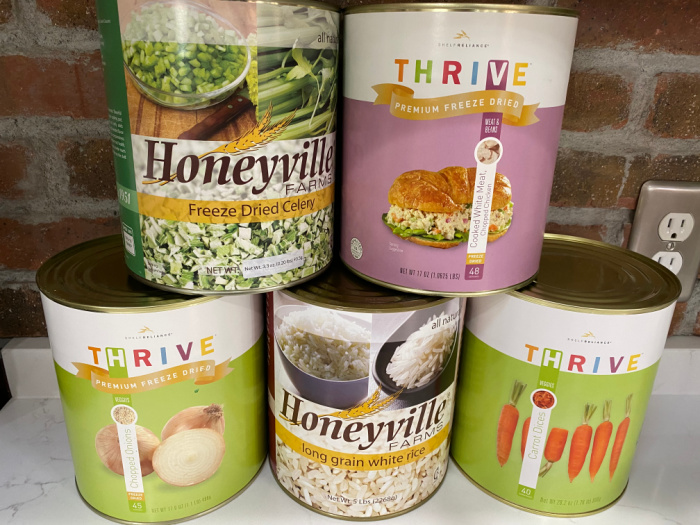
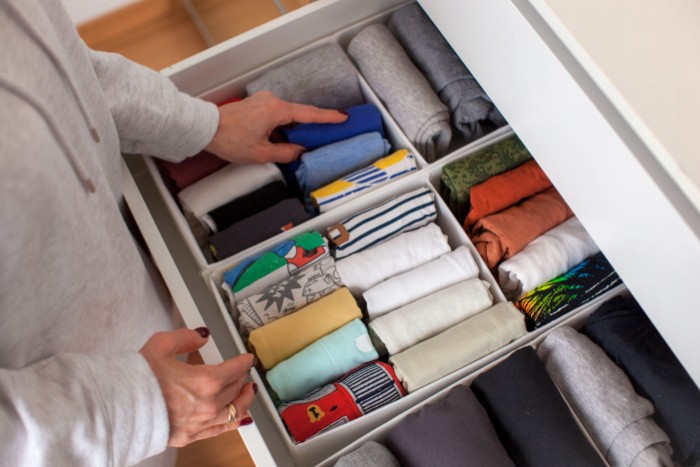

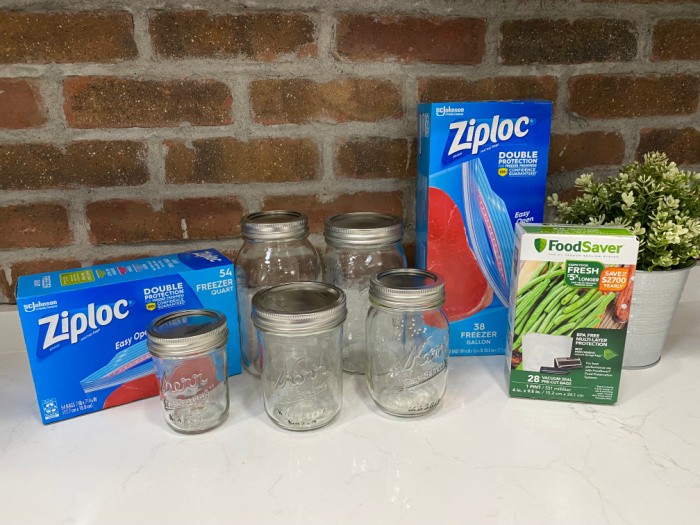

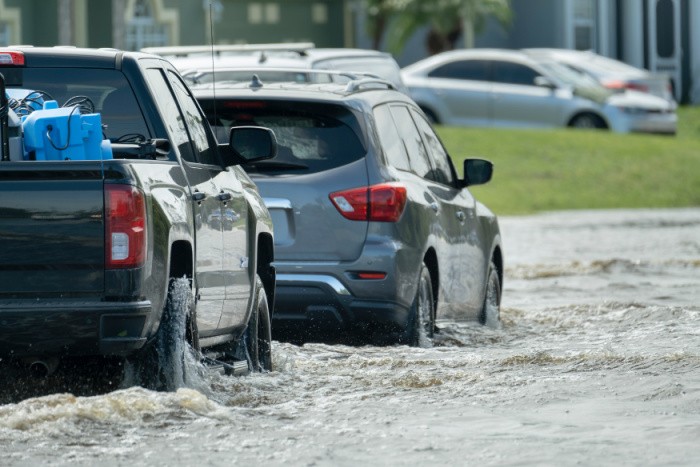













Chemlights from Dollar Tree. Also bring in your solar sidewalk lights at night and place them strategically along the hallway to the bathroom or other important places.
I’ve got a deep cycle with an inverter that runs the wife’s CPAT and a fan in the bedroom.
One year I borrowed a portable AC and put it in the living room and hung a blanket over the doorway and ran it on a small generator. Just slept in the recliner which we do sometimes anyway.
Hi Matt, I need to go check for those Chemlights at the Dollar Tree, thanks for the tip. I love the portable AC you used for the living room. The recliner is the best!! Great comment, Linda
Just did my annual clean out of the storm shelter. My Kaito radio stopped working. It was a pretty old one so I remembered you had a link. I got the yellow be so it stands out in the debris in the aftermath should it ever happen.
This new ones got a USB port which is nice.
Hi Matt, wow, good thing you checked the radio!! Do you have a storm shelter?? That is so awesome!! The USB port would be nice! Linda
We have all of these except for the hand and foot warmers. I’ll have to get some of them soon. We also have a wood heater, but it’s not set up yet. We also have a couple of generators. One is dual powered. Gas and/or Propane.
Hi Deborah, we only use hand warmers when the kids or grandkids go snowboarding or skiing. Some use them for hiking, they work great. In the desert, we need items to keep us cool more than warm. But I still like having a box available. Costco used to sell them up north but not here. You are lucky you have dual generators and a wood heater. I love it! Linda
Yes Linda, I’m very lucky. We used to lose power quite often. We don’t very often now. We had a week of below freezing and lots of snow in February, but we never lost power. We did use our propane fireplace to keep warm. That way we didn’t use the power that everyone else needed.
Install nightlights that automatically turn on brighter when the power goes out along halls and in the kitchen and bathroom. Most of them can also be used as a flashlight. Costco was selling a 3 pack of these – don’t know if they still do for $10. It’s made it nice to navigate the house without turning on a light if you get up in the night. I get back to sleep faster if my eyes haven’t been exposed to bright light. These are really nice to have on a regular basis.
If you can afford it I highly recommend replacing old leaky windows with the newer triple pane. It has been a game changer at my house. The house is a lot more comfortable and our utility bills went down. I no longer use our gas fireplace to add heat to my bedroom which was a cold spot at night. Now when I read to cover windows with awful black garbage bags I don’t have to worry about doing that.
Hi Kay, oh, triple pane windows are awesome! We had them once when we lived up north. They make a big difference in power bills. I have night lights everywhere throughout my house, I will check Costco the next time I go there. I love tips like this! Thank you, Linda
Hi Linda, great items and food for thought. Just an FYI for people buying manual can openers. I know a lot of people that have bought manual can openers from the dollar stores and thought wow now I am good! Then I said, try to open something with it. Ha Ha, they were so dull that they wouldn’t open anything or it took them 3-4 tries to get the cans open. The point of this story is to buy something of quality not some cheap POS just to check it off the list.
God Bless and stay safe…
Hi Bill, I agree, we do not want useless can openers or flashlights. My motto is to buy right the first time. Great comment, Linda
I was at my local Walmart the other day and saw a solar/ hand crank flashlight with built in radio. I already have a radio but figured hey why not buy this gadget anyway. It was originally $30. I got it on sale for $9. Stay blessed and prepared everyone!!
Hi Audrey, $9.00 is a great buy! I love having more than one emergency radio, cooking device, can openers, or whatever. Good job! Linda
I am ready! Bring on the power outage! Ready – yes; bring it on – no!
I have a few of the hand warmers but, Linda, you know I am a big supporter of hot water bottles!! I can justify the use of my butane to heat water that goes in the bottle and is reusable! I will only use the disposable hand warmers IF and only IF, I start running out of my supply of butane for my one burner stove.
I have several flashlights that take batteries and the batteries to power them. But, I purchased some of the Energizer Emergency flashlights – they are plugged in to the power and when the power goes out, they light up immediately (or when they are removed from the power).
As for the radio, I have a radio that has multiple ways to charge it: power cord, solar, battery, and crank. It has a flashlight, strobe light, USB charging port as well as AM/FM and weather channels. It is put away or I would note the brand. It was not a cheap radio – I think it ran about $60 5 years ago. I also have 3 solar chargers for powering my cell phone along with a non-solar battery bank for the cell phone.
You have always suggested having more than one can opener so I have 4 + different ways to open cans. As I do not have an electric can opener anyway, all of my ways are manual! Well, one is run on batteries as I had shoulder surgery a year ago and couldn’t use a regular manual can opener for a few months.
Hi Leanne, I do not worry about you, you are one prepared woman! You are the one that reminded me about the water bottles, a genius idea! We all grew up using them, and somehow I shelved the idea until you reminded me about them!! Yay! Solar chargers are critical for times when we have zero power. Thank goodness there are so many choices. Linda
better than a gas generator is a solar generator – with a gas generator, it’s only as good as long as you have fuel – a solar generator never runs out of fuel (tho’ it does nothing during the nite) – but the long term advantage of solar over gas is incomparable – and you can buy or make as many solar generators as you want/need and gang them for the capacity you wish
and you can get batteries, old car batteries are adequate, even you tho’ they don’t last forever like gel cell batteries – they will get you thru an emergency with essential power – and you can upgrade your battery storage to whatever capacity you wish – but, remember, you usually don’t have the same nitetime need for power as you do daytime
you can buy them commercially or watch DIY videos on youtube
Hi Greg, I agree with you, Mark and I have not purchased a gas generator for this very reason. But, our winters are pretty mild. The food in the freezer will be BBQ’d for the neighbors. Life is good when you have more than one option. Linda
again, ms linda, thanks so much for all you do to inform and get some folks off their keister!
Hi Greg, thank you, cousin! We do need to get people prepared! Linda
Has anyone had luck with outdated had and feet warmers?
Hi BBarton, this is a great question. We rotate ours so I only buy what we can use in a year. Linda
that’s awesome! I love the hot water bottles! you can build a clear plexiglass box with a lid or door and put those bottles in it in a sunny window and get up over 100 degrees! and no butane!
and like your solar cell charger, get some solar battery chargers with rechargeable batteries and you’ll have endless power!
Hi Greg, solar is the way to go for sure! Leanne mentioned the Hot Water Bottles one day and I quickly ordered one. My mom always had a hot water bottle. Linda
I was confused about the article regarding an emergency radio. In the picture you have a basic radio that covers different frequencies, but the link to amazon refers to a Kaito radio. Kaito radios along with most of the copy cat radio are worthless as they try to do too much with very little power. You don’t need a radio with a flash light, phone charger due to the fact that the solar charger on these radios are totally worthless, and the crank is a good idea, but it is also totally worthless. I really don’t feel like cranking on it for 5 minutes to get 1 minute of radio. Don’t go by the reviews as some of those are fake or are based on the fact that they were NEVER used in an emergency. It is better if you just got a basic battery powered AM/FM/Weather radio that uses rechargeable batteries. In fact, you can get hand held FRS/GMRS communications radios that you can tune to FM/Weather stations and more. Eliminating the need for a dedicated radio you described.
Hi Larry, I appreciate your comment. I’ve been sent several emergency radios over the years to do reviews on. I sent them all back. I finally found the one in the picture off of eBay. It’s amazing but in all reality, we would all love a Ham radio license or at least some of us. Great tip, Linda
Sorry, This was an after thought. The FRS radios do not require a license, just common courtesy. The FRS/GMRS radios require a license only if you use the GMRS frequencies. The GMRS license was $60 five years ago, renewable every five years. No testing. Some units have FM stations available to listen to. I personally have 4 of those radios for use in an emergency situation. One for FM/weather. One for GMRS emergency channels and two for personal use in our two cars in case of an evacuation. If, no when, problems happen a FRS/GMRS radio will be the only communications available. Most cell towers will on generators during an emergency and only have power/fuel for three days. Plan ahead and get a FRS/GMRS radio with rechargeable batteries/charger. Get an inverter (DC to AC) that can connect to your car battery, then you can plug your battery charger into the inverter to recharge the batteries, phone, etc.
Hi Larry, grab a link for the one I should buy, I need to get my act together. I need one. Thanks, Larry for your help, Linda
So what is the radio in the picture?
Hi Larry, let me get the link. I bought it off of eBay. Let me grab the ridiculous price one on Amazon. Most are used, I wanted NEW. They start at $69 and up to $174.00 I paid. $50 or so on eBay. Here’s the link: https://amzn.to/3cvYbaG
Emergency radio is built to handle the elements, as well as a power outage
Hand crank can be used to recharge the built-in battery
Tunes AM/FM and 2 shortwave bands, including weather radio
Tuning knob features a superimposed fine-tuning control knob
Features a white LED emergency light
My original hand held radio was a BaoFeng UV5A. I have since moved up to a newer, improved version. I bought them in a set of 5, sold 2 of them to neighbors and kept the other three. With these radios you need to remember that the amount of power (WATTS) determines how far you can transmit. Right now the maximum number of watts available in a hand held is 8 watts as determined by the FCC. Most, if not all of the hand held radios are made in China, but they are fairly good radios. You can also buy a larger extended life battery for them which adds to your run time on the air. When you get one it will have to be programmed for the frequencies you want FRS, GMRS, marine or all three, plus weather frequencies. There are Youtube videos on how to do that. The radios come with a small antenna that you can replace with a larger 14 inch whip antenna if you wish. Some kits come with a whip antenna. I would also recommend you get a magnetic mounted car antenna to help extend your range when you’re driving. Radio performance is always determined by the amount of interference in your area, such as trees, buildings, hills, etc. All hand held radios are “line-of-sight”.
https://www.amazon.com/dp/B00MAULSOK/ref=redir_mobile_desktop?_encoding=UTF8&aaxitk=7ihKLfXqMGGlzpWkVhS1fg&hsa_cr_id=4038696720401&pd_rd_plhdr=t&pd_rd_r=3886e33a-e7c8-4f57-b1e4-07d1fe482ee9&pd_rd_w=Rz1CS&pd_rd_wg=bQIcM&ref_=sbx_be_s_sparkle_td_asin_0_title
https://www.amazon.com/dp/B07MNTFD4P/ref=sspa_dk_detail_1?psc=1&pd_rd_i=B07MNTFD4P&pd_rd_w=LqYGr&pf_rd_p=cbc856ed-1371-4f23-b89d-d3fb30edf66d&pd_rd_wg=lrPEm&pf_rd_r=BXMDGAS7R2D8FW3046DY&pd_rd_r=39cb0d0d-8e23-456b-abba-dcf18722d14d&spLa=ZW5jcnlwdGVkUXVhbGlmaWVyPUEzUU1CUDFMTFFTMFk4JmVuY3J5cHRlZElkPUEwOTk5MTYwM0gzVVI5N0hYUDFXViZlbmNyeXB0ZWRBZElkPUEwMzU1MzM4MzI0SU9NOTc2WE45RSZ3aWRnZXROYW1lPXNwX2RldGFpbF90aGVtYXRpYyZhY3Rpb249Y2xpY2tSZWRpcmVjdCZkb05vdExvZ0NsaWNrPXRydWU=
https://www.amazon.com/Authentic-NA-771-15-6-Inch-SMA-Female-BTECH/dp/B00KC4PWQQ/ref=pd_bxgy_2/143-5589686-0855031?_encoding=UTF8&pd_rd_i=B00KC4PWQQ&pd_rd_r=af6b209f-1b08-4ea5-89d1-d2494001d4da&pd_rd_w=DkXtb&pd_rd_wg=CqD9b&pf_rd_p=f325d01c-4658-4593-be83-3e12ca663f0e&pf_rd_r=CQKEHERY0R17QQ4XPHPD&psc=1&refRID=CQKEHERY0R17QQ4XPHPD
Hi Larry, this is awesome, can I share this on my FaceBook page? People need to learn this, thank you so much, Linda
Of course. Nothing I’ve mentioned is restricted and most of the information is common knowledge among ham radio operators. I encourage more people to become familiar with their equipment and get the proper license from the FCC. There are some more very expensive radios on the market including those sold in retail stores. But for the money, being frugal myself, BaoFeng was in the right price range and performance, even after all of the modifications.
Hi Larry, thank you, I had heard about the BaoFeng one, but those links hep me. I need to get a handle on this. Thanks again, Linda
Y’all check these out. Light bulbs that store power and will come on when the power goes out. We just discovered them
(https)www.walmart.com/ip/Great-Value-LED-Light-Bulb-9-Watts-60W-Equivalent-A19-Battery-Backup-Lamp-E26-Medium-Base-Non-Dimmable-Daylight-1-Pack/842995809
Hi Matt, thanks for sharing that link, I have never heard of those! I love it! Linda
Thanks, so much, Matt,
Those sound so good that I just ordered a bunch for us and a couple of single ladies in the neighborhood that Pat and I try to help with preps since they are on a very limited budget. Our area often has power blips where the power clicks off anywhere from a few seconds to several minutes. That’s why we have UPS devices on all of our electronics. These will be a great help with light for those instances. Have a great week, neighbor!
Hi Harry, you unscrew the bulb and put your finger over the end and you have a flashlight for 90 minutes! Pretty cool! Linda
Thanks, Linda,
I will tell our two neighbor ladies about that trick. For Pat and I, we always have our Bushnell Lantern/flashlight combo units handy enough that we can easily get to them within 90 minutes. LOL! Have a great week!!
HI Harry, those Bushnell Lantern/Flashlights are the best!!! Great tip! Linda
Hi, Linda, the power company made all the lines trip really easy here, so a squirrel on the lines can trip a power outage. Needless to say, we are used to the power going out a lot! My comment to help people stay warm is to remember to have as much insulation below you as above. Like if you are all sleeping in one room to limit heating. Camping mattresses are great for softness, but as many blankets below as above will keep you warmer. Thanks for all your great info, stay safe and God bess!
Hi Jan, a squirrel, wow! LOL! Hopefully, you have a lot of good surge protectors!! Great comment on staying warm!! Linda
Linda, how’s this for irony. I was reading your article when our power went out. Fortunately, it was only off for ten minutes. I love Larry’s and Matt’s comments on radios and solar lights. My Kaito stopped working recently (12 years old) and I’m shopping for a better emergency radio. I’ll probably end up with a Baofeng. Jane and I have walkie talkies we use to keep in touch around the homestead or if we are taking two vehicles somewhere. I have a gas powered gennie and a homebuilt solar generator and am accumulating the parts for a better solar generator. The most expensive components are the batteries and inverters. The first solar generator I built is a portable that is too lightweight and our high winds can blow it over and damage it. That’s happened twice when I didn’t anchor it down well enough. So the second one will be permanently mounted–just like my whole home solar system is. The batteries to run my entire home will run about $10,000 so I haven’t made that purchase yet. And so far my existing generators have been adequate. But a long term outage would cause me to have to cut back power to just the kitchen, garage (where two or our freezers are) and the Master Bedroom (where my CPAP is). We’ve almost got enough saved up to get those batteries and the inverter and tie it to our existing system so we can go off grid but we’re not quite there yet.
We have solar powered flashlights and lanterns as backups to our battery powered ones, but a few years ago I bought a pair of Nokero Solar powered light bulbs and they work great. They are more expensive than the ones Matt mentioned (I’ll have to get a few of those) but they have proven very reliable. Here’s a link: https://www.amazon.com/dp/B00410RC7O/ref=as_sl_pc_tf_til?tag=rdw0a-20&linkCode=w00&linkId=849a055346fb108fe8e082bfe11e0d3e&creativeASIN=B00410RC7O
Hi Ray, thanks for the link, I love learning about new brands! I would love a full-house generator, what you are doing sounds amazing! Great comment, Linda
Thanks Matt! We are going to check out these light bulbs.
Our island just had a power outage that lasted several hours due to a wind storm and I was comfortable throughout, even managed to bake some chocolate cupcakes on top of the woodstove using a roasting pan as an oven. I keep my emergency lanterns and other devices charged up and have a couple of old car boosters with USB port that I keep charged as well and can get several device charges from. The only problem is keeping the fridge and freezer going. Luckily this time it was only overnight and late into the next afternoon so stuff stayed frozen but another day or two would have been an issue. It’s not usually cold enough outside here to keep things frozen. I’m not keen on gas generators for several reasons, would like to get a solar generator but one capable of running a freezer is well outside my budget. I thought I might try to get hold of a 12V portable freezer that I could run with a solar generator and put the most expensive frozen stuff in it. At least the meat and fish. Need to do some more calculations first. My Eton Rover Red Cross radio is hand crank or USB chargeable and seems to run forever on a charge if you don’t start using the flashlight. I use a Biolite lighting system with various components, also have one of their stoves. (https)ca.bioliteenergy.com/products#lighting
HI Alice, I wish I could get a generator, it’s not in my budget, and never will be. The cost of the generator would be more than what is in my freezer. It’s all about the numbers like you said. The calculations or numbers same thing. Thank you for the link. Linda
We are experiencing unusually warm weather, so my husband looked into adding more insulation. With the increase in heat and electricity we are trying to figure out how to keep costs down, without freezing. Even without a power outage, staying warm is going to require effort.
Hi Chris, I totally agree with you. If you are going to stay in your home I would add insulation. I had to push to get 55-something in my attic down in Southern Utah. The guy said it was more than what I needed it. I also purchased a solar attic fan to cool the attic. I then purchased sunscreens to keep the heat out of my house on certain windows. My utility bill was cut by about 30% in the first year. Then I purchased soar tubes to let light in without having to turn any lights on. The best purchase ever. Of course, then we sold a year later, oh well. Staying cool or warm is critical! Linda
Linda, We have a sky light with a cylinder going thru the attic to the roof in out guest bath because there is no outside light. Is that the same as the solar tubes you are referring to??
Hi Chris, yes, they are very similar. Linda